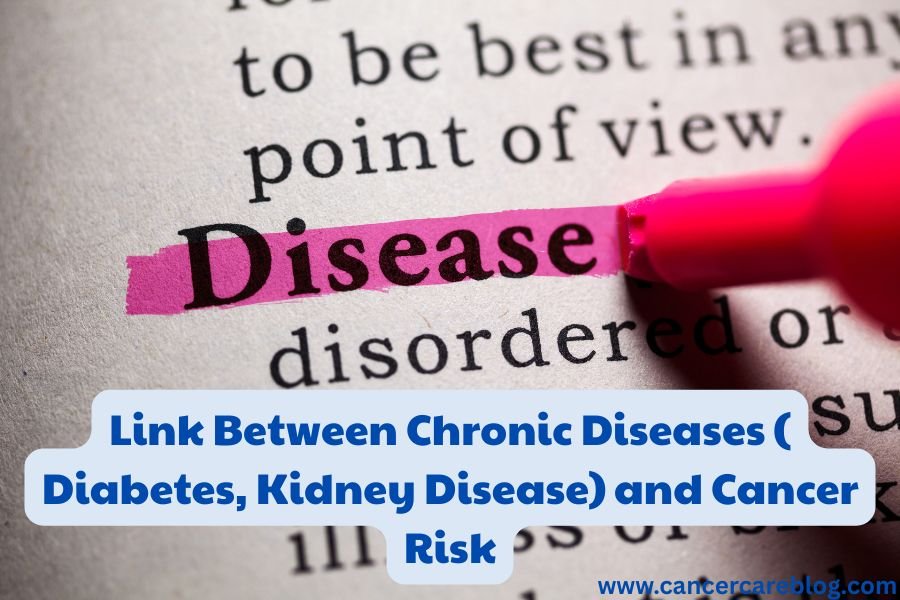If you’re living with a chronic condition like diabetes or kidney disease, your health is already something you think about daily. But did you know that these diseases may also raise your cancer risk?
It’s a connection many people don’t talk about. Chronic illnesses are often treated in isolation, but your body works as a whole. When one part is affected long-term, other systems suffer—including your immune system, your hormones, and your cells.
In this blog, we’ll explore how chronic diseases and cancer are connected, what science says, and what you can do to lower your risk.
What Are Chronic Diseases?
Chronic diseases are health conditions that last a year or more and require ongoing medical care or limit daily activities. The most common include:
-
Type 2 diabetes
-
Chronic kidney disease (CKD)
-
Heart disease
-
Hypertension (high blood pressure)
-
Obesity
-
Autoimmune diseases like lupus or rheumatoid arthritis
These conditions can increase inflammation, disrupt your metabolism, and change how cells grow—all of which may contribute to the development of cancer.
How Diabetes Affects Cancer Risk
Many studies have shown that people with type 2 diabetes are more likely to develop certain types of cancer, including:
-
Liver cancer
-
Pancreatic cancer
-
Colorectal cancer
-
Breast cancer
-
Endometrial cancer
-
Bladder cancer
Why?
Diabetes leads to high blood sugar (glucose) and high insulin levels. Over time, this environment can:
-
Promote cell growth (even abnormal cells)
-
Increase inflammation, which can damage DNA
-
Suppress the immune system, making it harder to detect and destroy cancer cells
Key Insight:
People with diabetes are about 20–25% more likely to be diagnosed with cancer than those without it.
Chronic Kidney Disease and Cancer
Chronic kidney disease (CKD) affects how your kidneys filter waste. But it also impacts your entire body.
CKD increases your risk for:
-
Kidney cancer
-
Bladder cancer
-
Thyroid cancer
-
Liver cancer
Why?
When kidneys don’t work properly:
-
Toxins stay in the body longer, damaging tissues
-
The immune system weakens
-
Hormone levels get disrupted
-
Inflammation becomes chronic
People with end-stage renal disease (ESRD), especially those on dialysis, have a significantly higher chance of developing renal cell carcinoma (a common kidney cancer).
Other Chronic Conditions That Raise Cancer Risk
1. Obesity
Excess weight isn’t just about appearance. Fat cells release hormones and proteins that increase inflammation and estrogen levels—both linked to higher cancer risk.
Cancers associated with obesity include:
-
Breast
-
Uterine
-
Colorectal
-
Kidney
-
Gallbladder
-
Esophageal
-
Pancreatic
2. Heart Disease & Hypertension
Chronic cardiovascular issues may not directly cause cancer but often come with shared risk factors: smoking, poor diet, and lack of exercise. These overlap with what increases cancer risk too.
3. Autoimmune Diseases
Lupus, rheumatoid arthritis, and other autoimmune conditions involve an overactive immune system. The same immune dysfunction that causes your body to attack itself can fail to detect early cancer cells.
Shared Risk Factors: The Overlap Between Chronic Illness and Cancer
Let’s break it down. Chronic diseases and cancer share several lifestyle-related risks:
-
Poor diet (processed foods, high sugar, low fiber)
-
Physical inactivity
-
Tobacco use
-
Alcohol overuse
-
Environmental toxins
-
Chronic stress
-
Sleep disorders
If you’ve been diagnosed with a chronic condition, managing these risk factors becomes even more important.
The Role of Inflammation
One of the strongest biological links between chronic disease and cancer is chronic inflammation.
When inflammation lasts too long, it:
-
Damages healthy tissue
-
Triggers continuous repair cycles (increasing chance of mutations)
-
Stimulates abnormal cell growth
Chronic inflammation is a silent threat. It often shows no symptoms but plays a huge role in cancer development.
What You Can Do: Lowering Your Cancer Risk
If you live with a chronic illness, don’t panic. Instead, take control with these steps:
1. Control the Disease
-
Keep your blood sugar stable if diabetic
-
Manage blood pressure
-
Take medications as prescribed
-
Monitor lab tests regularly
-
Follow up with your specialist
The better your chronic condition is managed, the lower your cancer risk becomes.
2. Follow a Cancer-Preventive Diet
-
Eat more plant-based foods: fruits, vegetables, whole grains
-
Limit processed meats and red meat
-
Avoid sugary beverages
-
Stay hydrated
-
Include anti-inflammatory foods: turmeric, green tea, berries, olive oil
3. Move Daily
Exercise helps reduce insulin resistance, control weight, and lower inflammation. Even walking 30 minutes a day can make a big difference.
4. Quit Smoking
Tobacco worsens all chronic diseases and is one of the top causes of cancer. If you need support, ask your doctor or try a smoking cessation program.
5. Limit Alcohol
Heavy drinking increases the risk of liver, esophageal, and breast cancer. Keep it minimal—or avoid it altogether if you have liver or kidney disease.
6. Stay Up to Date with Screenings
Your doctor may recommend cancer screening tests earlier or more often than usual if you have chronic conditions. This may include:
-
Colonoscopy
-
Mammogram
-
Low-dose CT scan (for smokers)
-
Prostate check
-
Pap smear
Early detection saves lives.
7. Manage Stress and Sleep
Long-term stress can worsen both chronic disease and cancer risk. Try meditation, therapy, journaling, or simply connecting with loved ones.
Sleep 7–8 hours a night. Your body needs that time to repair and reset.
Final Thoughts
Living with diabetes, kidney disease, or other chronic conditions doesn’t mean cancer is inevitable. But it does mean you need to be more aware—and more proactive.
By understanding how these illnesses are linked to cancer, you can take smart steps to protect yourself. Prevention starts with knowledge—and action.
You’re in control of your next chapter.



